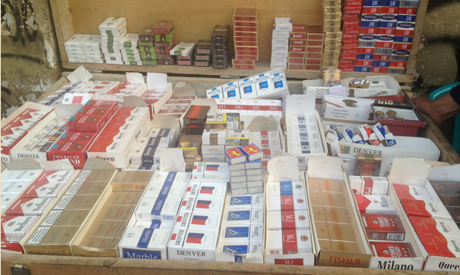Mohamed, a Palestinian from the southern Gaza town of Rafah, risked his life as he spends the whole night moving new shipment of smuggled tobacco from a tunnel underneath the borders between southern Gaza Strip and Egypt.
While the thin and short 37-year-old man worked, the noise of gunshots and sometimes blasts could be clearly heard from the Egyptian side of the borders that are under the excessive Egyptian army observation.
In the past two years, the Egyptian army launched large and intensive security campaigns, destroying hundreds of tunnels used for smuggling goods from Egypt to Gaza. The army also destroyed and removed constructions and houses built on a one-kilometer zone along the borderline with the Gaza Strip.
Mohamed, who declined to give his last name, said that amid the new Egyptian army military and security tactics, “smugglers get smarter and create their own smuggling tactics and tricks, either in digging new tunnels or inventing new methods of smuggling.”
Mohamed’s main job is to smuggle cigarettes and other kinds of tobacco. He said that after hundreds of tunnels were destroyed, only 10 percent of tunnels are still operating now. Smugglers have to find new ways to earn money.
“In the past, we used to dig large tunnels with wider mouth, but now we put into the tunnel a plastic tube with narrow diameter which is barely enough to insert a pack of cigarette. The tube can hold dozens of cigarettes packs. Then, I pull the tube and collect the shipment of cigarettes,” said Mohamed.
Mohamed’s colleague, who also declined to give his full name, just went out from a tunnel after spending 12 hours inside it. “The growing prices of cigarettes and its high profits make us do our best to smuggle it,” he said, adding that “it is a risky business. But as workers, we get little payment.”
The declining business of smuggled cigarettes made it hard for Hassan al-Jalta to support his family nowadays. Working as a cigarettes vendor in Gaza for more than seven years, Al-Jalta said “the prices of cigarettes has doubled compared with several years ago.”
Al-Jalta in his mid 40s is one of the hundreds of unemployed Palestinians who want to make their ends meet by selling cigarettes in the streets.
Israel imposed a tight blockade over the coastal enclave after Islamic Hamas movement’s violent takeover of the territory in 2007.
“Selling cigarettes is not a good business anymore because the prices are getting higher for vendors and for consumers,” said al-Jalta, as he carried on his shoulders a box filled with smuggled packs of cigarettes. “I hope I can have a choice better than selling smuggled cigarettes,” he added.
Local tobacco merchants said the cost of one pack of smuggled cigarettes is less than 10 New Israeli Shekels (NIS) ($1=3.86 NIS). But because there are less cigarettes in the Gaza market due to the difficulties of smuggling it, the price of one pack usually grows between 16 NIS to 35 NIS.
The prices of tobaccos and cigarettes grew further after Israeli waged large-scale military operation on the Gaza Strip last summer.
Smuggling though tunnels began several months after Islamic Hamas movement’s control of the Gaza Strip and the Israeli blockade. This business flourished after the ouster of Egyptian President Hosni Mubarak in 2011, but declined since Egyptian President Mohamed Morsi was ousted and detained.
Since then, 90 percent of the tunnels underneath the borders were destroyed, announced by Egyptian army and Hamas.
A senior official in the Gaza ministry of finance told Xinhua on condition of anonymity that the government in Gaza increased the taxes on smuggled cigarettes from Egypt as well as the cigarettes coming through Israel to help getting out of a financial crisis.
Economic expert Mo’een Rajab told Xinhua that the reason the tobaccos became extremely expensive is because of the recent security measures of the Egyptian army against smuggling and the government tax policy.
“Big cigarettes merchants usually buy huge amounts of cigarettes and tobaccos with lower prices and keep it in their stores until the prices get higher. Then they sell it in the markets to make large profit out of it,” said Rajab, adding that “tobacco smuggling is declining and the business is drying up.”
FRENCH VERSION


